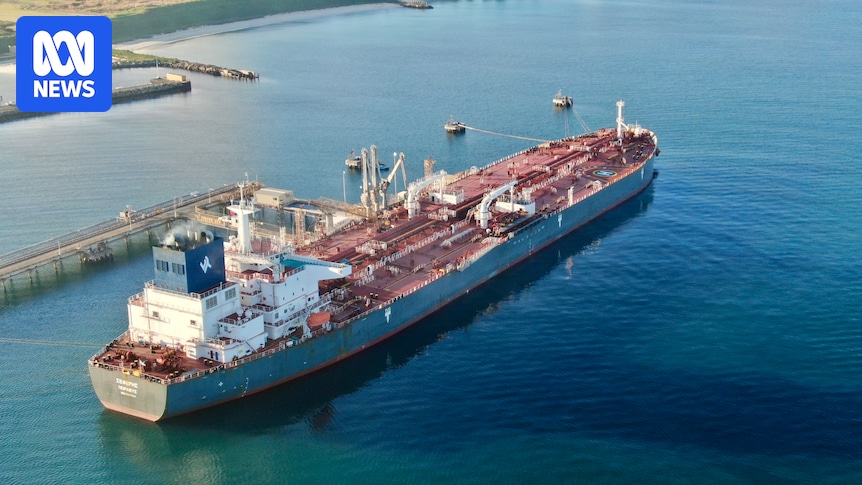A tanker believed to be carrying fuel derived from Russian oil has docked in Western Australia, with questions surrounding the cargo exposing glaring loopholes in government sanctions against Moscow.
Seferis sails under a Greek flag and berthed in Kwinana, 40 kilometres south of Perth, about 3am on Wednesday after departing India on July 11.
Australia sanctioned Russian oil soon after it invaded Ukraine in February 2022.
Claims Russian ‘blood oil’ fuelling motorists as tanker nears WA
But India did not and refines Russian crude oil into liquid fuels like diesel and petroleum.
When Australia purchases those products from India, it could be inadvertently funding the war in Ukraine.
The issue is there is no reliable way to confirm the origins of the fuel on Seferis, let alone what is being pumped at the bowser.
Sanction loophole
Russia’s income from exporting oil is the backbone of its economy and has effectively bankrolled the nation’s war machine in Ukraine for three-and-a–half years.
While Australia has committed to starving that revenue, the involvement of third parties like India has muddied the waters.
Australian Strategic Policy Institute director of national security John Coyne said the majority of the country’s imported liquid fuel does not come from India, but that does not clear up the issue at hand.
John Coyne says Australia could follow the lead of the EU to ensure Russian-tainted fuel does not end up in its supply chain. (ABC News: Matt Roberts)
“If Australia is to meet its full commitment of applying those sanctions, then it must also ensure that we don’t contribute to a system that washes Russian oil through India,” he said.
“We don’t know where, how and what percentage of that goes into our liquid fuel supply chain, so that’s where it gets a bit tricky.”
Mr Coyne said Australia could follow the lead of the European Union, which applied sanctions to refineries that use Russian crude oil.
Seferis is thought to have been loaded with Russian oil in India in contravention of sanctions. (ABC News: Glyn Jones)
“The first step here is making that very clear declaration that Australia will not take liquid fuels that find their origin in Russian oil and result in the transfer of money back into Russia that inevitably is used to prosecute and fund the campaign in Ukraine,” he said.
Alarming figures
Ukrainian and Australian campaigners say Seferis is delivering fuel from the Jamnagar refinery in India.
Russia’s ‘shadow fleet’ could be sabotaging key EU infrastructure
The Centre for Research on Energy and Clean Air (CREA) found in the first half of this year, almost half of Jamnagar’s crude oil feedstock came from Russia.
“This crude is refined into a variety of oil products — gasoline, diesel, jet fuel etc. Any country importing these products from this specific refinery can expect Russian molecules in them,” CREA’s EU-Russia analyst Vaibhav Raghunandan said.
CREA estimated in the first four months of 2025 Australia bought more than $1 billion of oil from India that was derived from Russian crude.
Seferis arrived at Kwinana in the early hours of the morning. (ABC News: Glyn Jones)
Earlier this month, two vessels carrying 175,000 tonnes of oil from the Jamnagar refinery berthed at Botany Bay in Sydney.
The federal government said it had imposed more than 1,500 sanctions on Russia, including measures to restrict the import of oil that originated in Russia.
In June, Foreign Minister Penny Wong announced Australia’s first sanctions against Russia’s shadow fleet, which employs a variety of murky tactics to conceal the origins of its cargo.
Foreign minister Penny Wong says Australia is “evaluating options” to place more pressures on Russia’s income from oil. (ABC News: Che Chorley)
“Regrettably, the mechanisms we would need to track and monitor all energy products via third countries are not in place in those countries,” a spokesperson for Ms Wong said.
“We are evaluating options to place further pressure on Russia’s oil revenues.”
Seferis sails under a Greek flag, and its arrival at Kwinana has caused controversy. (ABC News: Glyn Jones)
Speaking on Tuesday, WA’s Defence Industries Minister Paul Papalia said the western world needed to be alert to the prospect of “Russia getting around sanctions and getting its oil to market … by sneaky means”.
“I think that is a real threat, anywhere in the world,” Mr Papalia said.
“Russia is still selling its oil around the world and they do it by third parties, things like refining in [third party] countries and then exporting.”
Option to cut off India available
An international law expert said without mechanisms to oversee third party imports, the option to cut off India from Australia’s supply is theoretically on the table.
Australia introduced its autonomous sanctions laws, allowing it to impose sanctions independently of the United Nations, in 2011 and it has given flexibility to the government to target restrictions.
“They can issue sanctions on a particular product and how we import that, which could include banning importing through a third-party state if it can be connected back to Russian oil,” said Melanie O’Brien, an associate professor of international law at the University of Western Australia.
Melanie O’Brien is an associate professor of international law at the University of Western Australia. (ABC News: Grace Burmas)
“We need to proof our sanctions to make sure that there isn’t a work around.”
Mr Coyne said the government would have to weigh up the implications of a drastic move like cutting ties with India.
“At the pump, Australians want to pay the cheapest possible price for liquid fuel,” he said.
“There’s [also] the pressure of our diplomatic relationship at a bilateral level with India.
“All of these things play out.”
Loading…Loading
